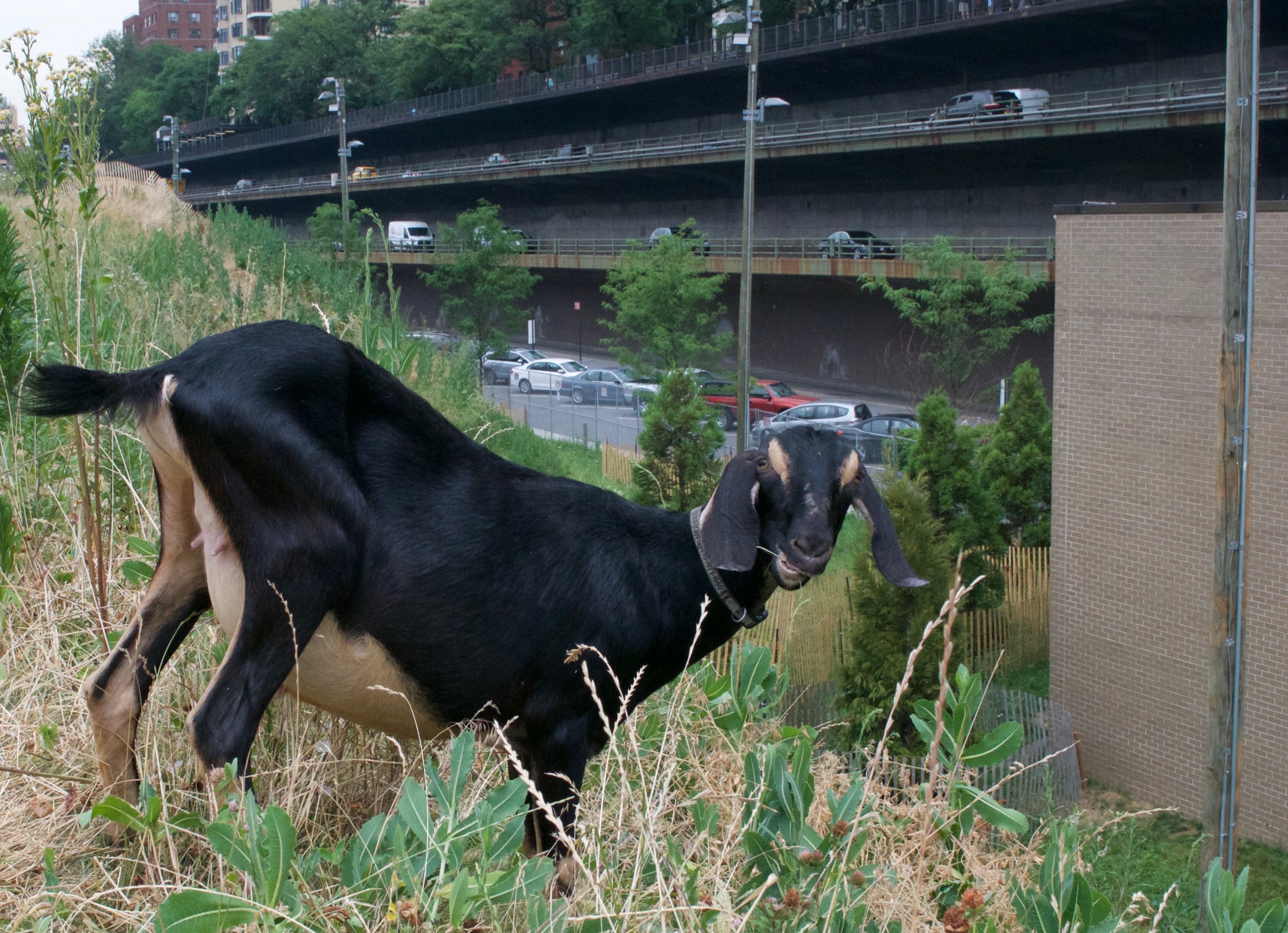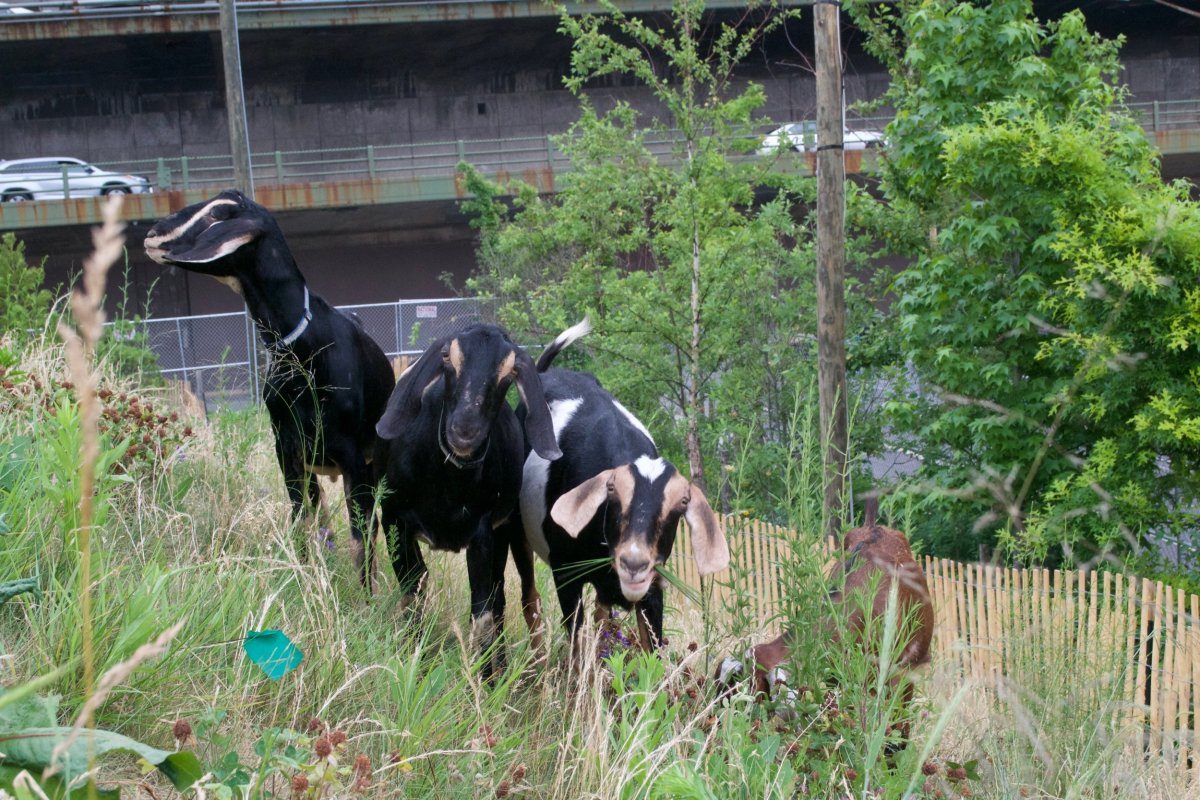
Minnie, Horatio, Hector and Eyebrows like to stick together while they work.
For the next two months, the four brothers will be tasked with ridding a 45-foot-high sound-blocking berm in Brooklyn Bridge Park of pesky weeds such as prickly lettuce and mugwort. Not only are they good at scaling the berm's steep hills (which come complete with spectacular views of the Manhattan skyline), but the four of them also delight in eating stubborn, leafy plants.
That's because they're Nubian goats.
Brooklyn Bridge Park, which doesn't use herbicides or pesticides, is the latest outdoor area in New York City to use goats as an environmentally friendly and cost-effective way to manage organic spaces. Hector, Horatio, Eyebrows and Minnie, who arrived at the park earlier this week from a Long Island farm, are following in the hoofsteps of fellow goats who have cleared weeds from landscapes in Prospect Park in Brooklyn, Pelham Bay Park in the Bronx and Freshkills Park on Staten Island.
"Hopefully they're just going to cruise through, leave the grasses and eat the weeds, and we'll have a beautifully grassy berm for the future," says Rebecca McMackin, director of horticulture at Brooklyn Bridge Park. "Goats are certainly the most sustainable method of maintaining this landscape."
She adds: "We try to be as ecologically friendly as possible so the landscape can function as not only beautiful and functional for people, but also provide habitat for wildlife."
When they first arrived, the goats seemed slightly frazzled, as the park sits next to the Brooklyn-Queens Expressway (BQE) and its loud rumblings, says Rashid Poulson, horticultural supervisor at Brooklyn Bridge Park. The berm where the goats are stationed was designed to absorb the sound of passing trucks and cars, to help make the park and its piers more peaceful.
Hector the #goat having a spot of lunch (weeds) https://t.co/MI7onved2r
— Lucy Westcott (@lvzwestcott) June 24, 2016
Every day, each of the goats will eat around 50 pounds of weeds, roughly a quarter of their body weight, says McMacklin. Goats can be very effective at weeding because pulling a weed up from the root, or improper weeding, can often result in encouraging more growth. Instead, the goats will repeatedly eat the same weeds down to the ground.
"As the plants keep growing, the goats really exhaust the resources of the plants," says McMacklin. "Eventually [the weeds] die."
When they're done for the day, the brothers retire to a small shed for water, some hay and sleep. Friendly and curious, the four of them briefly trot over to sniff at the reporters who have come to meet them, and later move downhill to investigate a backpack and a tripod left on the ground.

"They're really curious, and they're still a little cautious because they're new here. If you clap and yell 'Ladies!' they come right to you," says McMackin, cautioning that the public shouldn't do this.
In fact, the public is encouraged to leave the goats alone altogether and let them get on with their jobs, despite their lovely looks and varied personalities—McMacklin says Eyebrows is the most curious, while Poulson says Hector is the pack's leader. After all, if people feed the goats it will make them less hungry for those delicious weeds.
Hector and his three brothers are currently in charge of landscaping around 1,000 square feet, or a third of the grassy berm, but if the pilot program proves successful, they could be called on to eat their way through more of the mound.
"The goats get to eat local, organic food in Brooklyn," says McMackin. "What's better than that?"
Uncommon Knowledge
Newsweek is committed to challenging conventional wisdom and finding connections in the search for common ground.
Newsweek is committed to challenging conventional wisdom and finding connections in the search for common ground.
About the writer
Before joining Newsweek, Lucy Westcott was an editorial fellow at The Wire. Previously a United Nations correspondent for the Inter ... Read more
To read how Newsweek uses AI as a newsroom tool, Click here.








